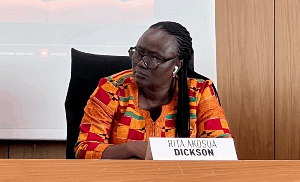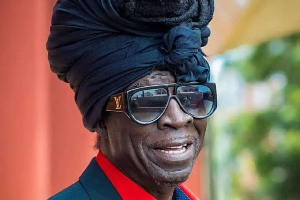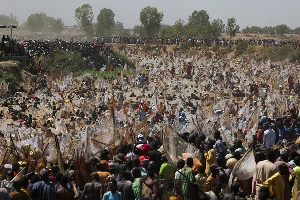The idea that people can refuse to work and at the same time draw their wages does not even make sense. This is because if I can lay down the tools of my trade and still be unaffected in terms of my income, then I will be persistent in my stay at home because there is no incentive for me to go to work.
And the old presumption that Ghanaian workers are free to sacrifice the people’s lives and welfare in pursuit of their goals is per se morbid. In a rather hyperbolic sense, it might not be all that different from the terrorists who cause the deaths of others in order to force their views or wishes on others.
But the single reason why strike actions have become rampant in the country is that the government has always been too weak to exercise its full power to withhold incomes of those of its workers that go on strike, or even to fire them outright for going on strike.
This is notwithstanding the kind of irreversible harm they perpetrate on the system, and the kinds of threats they pose to national survival. To the mass of Ghanaian workers, I say that the recourse to government ineptitude is to vote it out of office, but not to make the people chips to your demands for better conditions of service no matter how justified.
Of course the government has been generally inept in paying fair wages or even remunerating its workers on time. As we speak, there are teachers, doctors, nurses, pharmacists, NADMO staff and other category of workers who have just not been paid their remuneration.
All these people are innocent victims of government criminality insofar as the refusal to promptly pay the wages of those that have already worked for the government affronts the basic tenets of international labor laws, human rights and all the religious and moral laws and lore known to mankind.
The laborer is always deserving of his or her wages, and the need to pay those that have worked but not been paid cannot even be disputed here. Elsewhere, it will not be sufficient to pay workers their arrearage finally, but also with the requisite interests and consequential damages.
In this instance, those who refuse to continue working because they have not been paid for work already done have the full panoply of the universal moral code solidly behind them.
The issue is different with those asking for better conditions of service. These have to exercise their power to embark on strikes sparingly and look to the long term resolution of their grievance as lying within the democratic system. They cannot just go ahead and punish the people needlessly because of government’s recalcitrance.
Of course they might still take shelter under the labor laws of the country and proceed on strike at will, but that decision has nothing to do with any obligation by government to finance their strikes. This is because the whole notion of remuneration is so intrinsically tied up with work done that those that pay others that have not worked are almost engaged in an illegality.
And paying people for no work done subjects the government to irresponsibility and the giving of unjust reward to the undeserving, further fueling the wrong notion that workers can frivolously lay down their tools at any time without any consequences to their financial circumstances. The power to strike should be countermanded by the power to withhold salaries. Period.
And regarding remuneration in lieu of work done, that is the responsibility of the labor unions. They must garner enough resources to pay their own members during the duration of any strike they embark upon. Elsewhere, to withstand the financial burden brought on its members by the embarkation on strikes is the test of the durability and survivability of these unions.
The above notwithstanding, the salary scheme of the government must have as its general feature internal proportionalities and fairness that take into account patterns of inflation, productivity and social costs of adjustments. I believe the single spine salary structure was aimed at the economic dynamics of work remuneration.
But if it still presents any form of distortions and inequalities, the government must judiciously deal with them for the purpose of obtaining balance and equity in citizens’ remuneration. There should be a permanent formula for the adequate and automatic growth of citizens’ incomes so that they will be in accord with the prevailing socio-economic factors. And the indicia for this formula must be a visible matter within the public domain.
For it is a fact that the present system of salaries is grossly inequitable and inadequate, making the living standards of most Ghanaian workers to fall far below that of international poverty guidelines. In effect, the typical Ghanaian worker is receiving slave wages if compared to his or her foreign counterparts.Thus, the problem is not limited to doctors alone and neither is the solution. That is why the problem must be dealt with in a multi-faceted fashion by attacking the broader insufficiency of all workers’ incomes, and demanding a higher quality of work at the workplace for balance.
The notion that some type of rewarding conditions could be given to doctors alone without triggering distortions in other workers’ incomes is in and of itself naïve. The piece-meal solution to any workers’ grievances will only trigger other industrial actions by other workers who will logically conclude that the only language that the government understands is strike action. For this reason, a firm and fair government salary structure ought to be in place to address all the problems in whole. And on balance with fair wages should be accompanied rigorous supervision of the quality of work.
Also, it is a universal albeit popular fallacy to assume that any group of workers are so essential to the national survival that they have the power to hold the nation to ransom at any time of their choosing. Every worker in Ghana is as important as the other worker and deserves a fair remuneration for whatever contribution they are making to the survival of the nation. But every worker is receiving slave wages in some respect in this country. To wit, every worker is sacrificing for the survival of the nation, and no one group has the right to hold the nation to ransom on the notion that its services are more essential than others. That is why it is improper to solve the problem of one section of workers to the occlusion of the broader workforce.
All workers in the country are aggrieved and deserve a solution to their grievances. Thus, the government must be seen to tackle the matter holistically. Unfortunately, the NDC government has been found wanting in its commitment to the general welfare of all workers except for its own cronies. And the present anger of the workers is as a result of so many injustices and inequalities in the allocation of salaries and wages between the government officials and the general worker population.
We have a situation where the politicians have set for themselves juicy conditions of service that have left the mouths of the majority of Ghanaian workers watering in futile desire. Every Ghanaian is therefore a casualty of the government’s gross ineptitude. But that is no excuse to turn the suffering population into chips in order to vent some anger against the government whose members will never suffer no matter how long any worker strikes.
And in this sense, the question to ask is at what time did it become morally right to beat up on the people in order to have one’s way with the government? What did the people do to be deprived of their health, education and well-being? And why must the poor people’s taxes and resources be used to pay the wages of those that are using them as bargaining chips and directly causing their pain and suffering?
Those who have a smidgen of political history will acknowledge that injustices did not begin with this government of the day, and therefore justice will not be conferred on everybody overnight. Ours is a stunted democracy blighted by previous injustices but still in perpetual evolution to a more perfect society. And we have the power to contribute to this evolution by changing inept governments through the exercise of our democratic rights.
But in the meantime, every person must be part of the great sacrifices of our very nationhood, notwithstanding that they are sorely treated and have a genuine axe to grind with the government of the day. After all, nothing is repaired in lives lost or harms caused after weeks of industrial actions that inflict irreversible harm upon the innocent population.
The dead will still be dead, and those neglected students will be left to their fate while these abandoned jobs will be left undone, retrogressing the development of the nation for years to come even if we finally satisfy the demands of those that lay down their tools.
And any justification for any strike action will never wash because for any time T, there will be a group who are somewhat justified in laying down their tools. But these are still working no matter their grievance.
And if we have a broader vision of what our nation should become in the coming future, we will recognize that the better status we conceive for our nation is not enabled by rampant industrial actions which we embark upon while still receiving our pay; or the piecemeal solution to our industrial problems which we usually invent in the immediacy of the here and now; or the conception of our professional status in terms akin to demigods; or the destruction of our people for the benefit to our lives of the here and now.
Rather, it all requires a frontal effort and deep reflections on the sacrifices we can make so that the nation can progress with economic well-being for all regardless of politics, ethnicity or creed or religion or even profession. No measure of rightness justifies chaos within our body politic. And no matter how justified anybody’s demands from our government, nobody can be allowed to destroy the nation.
In such a context, the issue will never be about the rightness of our cause but rather, whether the country can survive under the aegis of our actions. If the country cannot survive, then we cannot persist in our actions because the death of the nation is also the death of all its citizens. In this instance, the only culprit is the government which we can organize the masses to vote out of office. That is all we can do.
Samuel Adjei Sarfo, J.D., is a general legal practitioner in the State of Texas. You can email him at sarfoadjei@yahoo.com
Opinions of Thursday, 20 August 2015
Columnist: Samuel Adjei Sarfo















